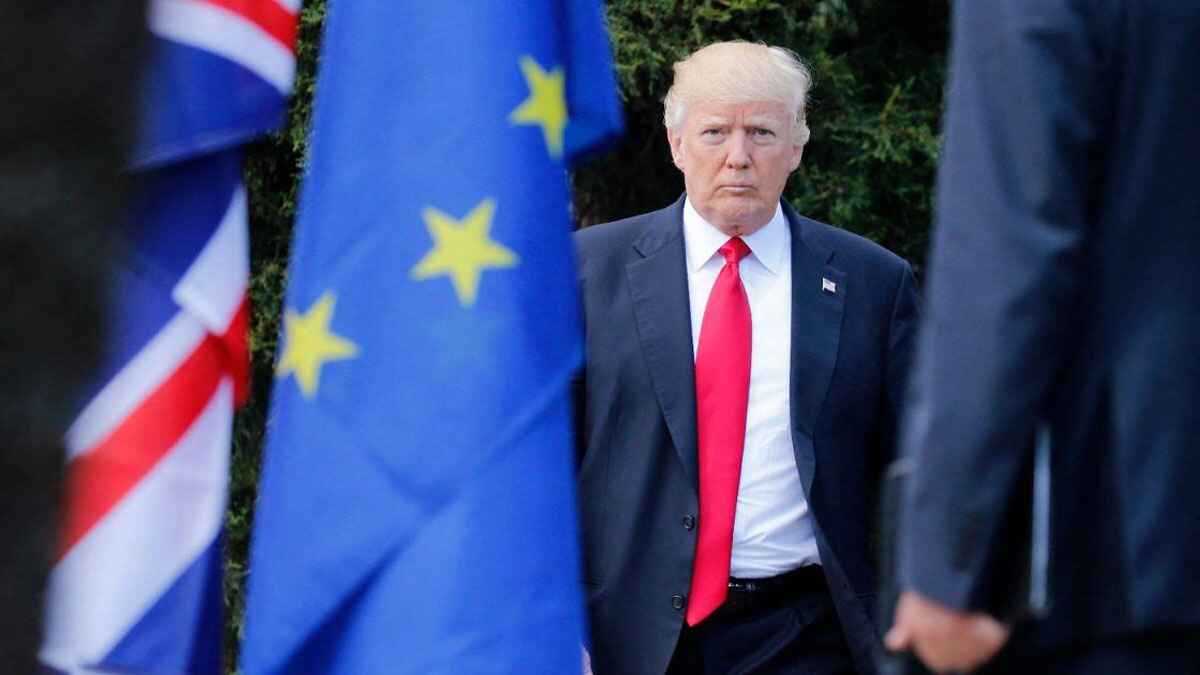Trump’s 25% EU Tariff Sparks Market Turmoil – Will Crypto Benefit?
27.02.2025 9:00 2 min. read Alexander Stefanov
Tensions are rising in global markets as the U.S. prepares to impose a 25% tariff on European imports, with the automotive sector taking the biggest hit.
President Trump reaffirmed the decision during a cabinet meeting, arguing that the European Union has long benefited from an unfair trade advantage. He claimed that the EU enjoys unrestricted access to U.S. markets while limiting American exports, justifying the need for corrective action.
The announcement has already sent ripples through financial markets, with the euro slipping 0.2% against the dollar. Investors are bracing for further instability, particularly in the cryptocurrency sector, which often reacts sharply to economic uncertainty. Analysts predict a spike in volatility as traders reassess risk exposure in response to escalating trade tensions.
The European Union has yet to outline its response, but past disputes suggest it may counter with its own trade barriers. Potential measures could target key American industries, including agriculture and manufacturing, exacerbating economic strain. Auto manufacturers on both sides of the Atlantic are already preparing for disruptions, as increased costs could weaken demand and impact production.
Historically, Bitcoin and other digital assets have thrived during periods of economic instability, as investors seek alternatives to traditional markets. With uncertainty surrounding U.S.-EU trade relations, demand for decentralized assets may rise.
Additionally, Trump’s proposed $4.5 trillion tax cut budget could influence liquidity, potentially fueling capital inflows into cryptocurrencies. Some analysts believe Bitcoin, Ethereum, and XRP could benefit from the broader financial shifts triggered by fiscal policy changes and trade disputes.
-
1
U.S. PCE Inflation Rises for First Time Since February, Fed Rate Cut Likely Delayed
27.06.2025 18:00 1 min. read -
2
Key U.S. Economic Events to Watch Next Week
06.07.2025 19:00 2 min. read -
3
Gold Beats U.S. Stock Market Over 25 Years, Even With Dividends Included
13.07.2025 15:00 1 min. read -
4
U.S. Announces Sweeping New Tariffs on 30+ Countries
12.07.2025 16:30 2 min. read -
5
US Inflation Heats Up in June, Fueling Uncertainty Around Fed Cuts
15.07.2025 16:15 2 min. read
BitGo Files Confidentially for IPO With SEC
BitGo Holdings, Inc. has taken a key step toward becoming a publicly traded company by confidentially submitting a draft registration statement on Form S-1 to the U.S. Securities and Exchange Commission (SEC).
Crypto Greed Index Stays Elevated for 9 Days — What it Signals Next?
The crypto market continues to flash bullish signals, with the CMC Fear & Greed Index holding at 67 despite a minor pullback from yesterday.
U.S. Public Pension Giant Boosts Palantir and Strategy Holdings in Q2
According to a report by Barron’s, the Ohio Public Employees Retirement System (OPERS) made notable adjustments to its portfolio in Q2 2025, significantly increasing exposure to Palantir and Strategy while cutting back on Lyft.
Key Crypto Events to Watch in the Next Months
As crypto markets gain momentum heading into the second half of 2025, a series of pivotal regulatory and macroeconomic events are poised to shape sentiment, liquidity, and price action across the space.
-
1
U.S. PCE Inflation Rises for First Time Since February, Fed Rate Cut Likely Delayed
27.06.2025 18:00 1 min. read -
2
Key U.S. Economic Events to Watch Next Week
06.07.2025 19:00 2 min. read -
3
Gold Beats U.S. Stock Market Over 25 Years, Even With Dividends Included
13.07.2025 15:00 1 min. read -
4
U.S. Announces Sweeping New Tariffs on 30+ Countries
12.07.2025 16:30 2 min. read -
5
US Inflation Heats Up in June, Fueling Uncertainty Around Fed Cuts
15.07.2025 16:15 2 min. read


